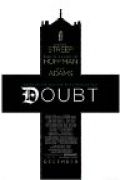
Directed by
John Patrick Shanley
105 minutes
Rated M
Reviewed by
Bernard Hemingway

Doubt
Synopsis: It's late autumn 1964 and at Saint Nicholas Church School in the Bronx, Father Brendan Flynn (Philip Seymour Hoffman), a progressive priest wants to get closer to the students and the parishioners but the school Principal, Sister Aloysius Beauvier (Meryl Streep) believes that sin is a constant threat and that fear is the only way to induce correct behaviour. When Sister James (Amy Adams) suggests to her that Father Flynn might be engaged in an improper relationship with a student (Joseph Foster) she sets about bringing her foe down.John Patrick Shanley's screen adaptation of his own Pulitzer Prize and Tony Award winning play boasts fine performances from Meryl Streep and Philip Seymour Hoffman but its greatest strength is Shanley's script which explores the nature of compassionate love with an insight and restraint more usually found in European cinema . Whilst the oblique, open-ended approach Shanley takes may frustrate those wanting clear-cut answers to the questions he raises, it is precisely his refusal to wrap up his story with a clear-cut moral that makes the film so effective. Couched largely in the form of more or less intense colloquies between the three main characters the film recalls David Mamet’s searing dialogic exchanges only without the stylistic mannerisms.
The story revolves around a suspected incident of sexual abuse by a priest and depicts the way in which this was possible within the hermetic environment of the Catholic Church of the times (Australian audiences will not fail to recall Fred Schepisi’s 1976 film The Devil’s Playground particularly in its depiction of the Christian Brother’s rather-too-cosseted lives). It is something which we now know to have been the case to a frightening extent. However Doubt is not concerned with solving whether or not in this instance the incident occurred, but rather in how we can practically distinguish between impersonal, compassionate love such as is central to religious teaching and personal, affectionate love that merges into the erotic. In the former context it regularly acquired a stern and thus seemingly contradictory face. Thus we have Sister Aloysius, an anachronistic adherent to the old school view that the flesh was constantly conspiring to drag the soul into a moral quagmire and could only be defeated through repression and strict order. Father Flynn on the other hand finds this unacceptable and believes that true love is kindness and a simple affection that recognizes the individual. But when and where does this kind of love become sexual and therefore transgressive love? Probably there is no answer to this complex question other than to say that it is one of the eternal struggles of existence with moral codes as a kind of pragmatically artificial response to it.
Doubt is a carefully detailed period piece, in this respect recalling last year’s Married Life, another intimately-scaled drama exploring issues of sexual morality. Streep is as always compelling whilst Hoffman, although a good few years her junior and far less experienced as an actor, he matches her line for line, scene for scene so that you’d never know it. Amy Adams has a much smaller part but is quietly impressive as the young nun whose naiveté starts the imbroglio. Shanley has directed only one film before, the first Tom Hanks/Meg Ryan pairing, Joe Versus The Volcano (1990), a so-so romantic comedy, but he does a good job here in translating his material from the stage to the more realistic medium of film.
The names of Streep and Hoffman will attract audiences and rightly so but their satisfaction will be inextricable from the deft intelligence of Shandley’s screenplay, a work that explores its ideas with rigour but also with sensitivity and understanding.

Want more about this film?


Want something different?




